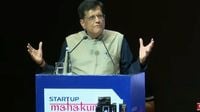In a recent address at the Startup Mahakumbh 2025, Union Minister Piyush Goyal ignited a heated debate within India's startup ecosystem by questioning the focus of many startups on convenience-driven services like food delivery and ice cream production. Goyal urged the Indian startup community to pivot towards high-tech sectors such as semiconductors, artificial intelligence, and robotics, suggesting that the current trajectory may not be sufficient for India to compete globally.
Goyal's comments, which included pointed remarks like, "Are we going to be happy being delivery boys and girls? Is that the destiny of India?" have drawn mixed reactions from entrepreneurs, investors, and industry leaders. The minister's challenge to the startup community was clear: to aspire for greater innovation and not settle for what he termed "entrepreneurship" rather than true startup culture.
Among those responding to Goyal's remarks was Zepto CEO Aadit Palicha, who took to LinkedIn to advocate for the value of consumer internet startups. He highlighted that Zepto alone employs nearly 150,000 people and contributes over ₹1,000 crores in taxes annually. Palicha argued that criticizing these ventures overlooks their role in job creation and economic growth. He wrote, "Why doesn’t India have its own large-scale foundational AI model? It’s because we still haven’t built great internet companies," emphasizing the need for a supportive environment for local champions.
Palicha's defense was echoed by Kushal Bhagia, a venture capitalist who noted the logistical prowess and technological capabilities inherent in India's delivery apps. Bhagia stated, "There is no need to dunk on delivery apps... it's insane that they manage to get millions of gig workers to do deliveries on time and give back time to millions of their users." He acknowledged Goyal's call for ambition but pushed back against the dismissal of service-focused startups.
However, not all responses were supportive of Goyal. BJP MP Praveen Khandelwal criticized Palicha's defense of consumer startups as "misplaced and illogical," asserting that Goyal raised valid concerns about the need for innovation that serves national interests rather than just convenience. Khandelwal stated, "Innovation must serve the nation, not just convenience. We need startups that solve real problems and build foundational technologies to drive India’s future." This sentiment resonated with some who believe that India's startup focus needs to shift towards more substantial technological advancements.
In the midst of this debate, Murtaza Amin, founder of BizProspex, shared his struggles as a startup founder in Burhanpur, Madhya Pradesh, where he faces bureaucratic hurdles and corruption that hinder innovation. Amin's post highlighted the challenges that many startups encounter, including the lack of infrastructure and the prevalence of bribery, which he argues stifles growth and creativity. He lamented, "I have been forced to pay bribes to various government departments... This corruption isn't just ethically wrong, it is unsustainable for our business." His plea for support from the government underscores the systemic issues that many startups face.
Meanwhile, Aman Gupta, co-founder of boAT and a judge on Shark Tank India, expressed solidarity with Goyal's vision, stating, "It’s not every day that the government asks founders to dream bigger." Gupta emphasized that India's startup ecosystem, while robust, must aim higher to compete with global leaders. He pointed out that benchmarking against countries like China and the US is a smart strategy, not a weakness.
As the debate continues, Goyal maintains that his comments were misinterpreted. He clarified, "My message for startups has been received positively except by some Congress party social media handles who are hell-bent on manufacturing a controversy." His assertion reflects the political undercurrents that often accompany discussions about innovation and entrepreneurship in India.
The discourse surrounding Goyal's remarks reveals a complex landscape within India's startup ecosystem, where the balance between supporting convenience-driven businesses and fostering deep-tech innovation remains a contentious issue. While some entrepreneurs defend the necessity of consumer-focused startups, others call for a broader vision that includes foundational technologies and ambitious projects.
As the Startup Mahakumbh concluded, the discussions ignited by Goyal's statements are likely to shape the future direction of India's startup policies and the entrepreneurial mindset in the country. The question remains: can India strike a balance between nurturing its existing startups and pushing for the kind of innovation that will elevate it on the global stage?





